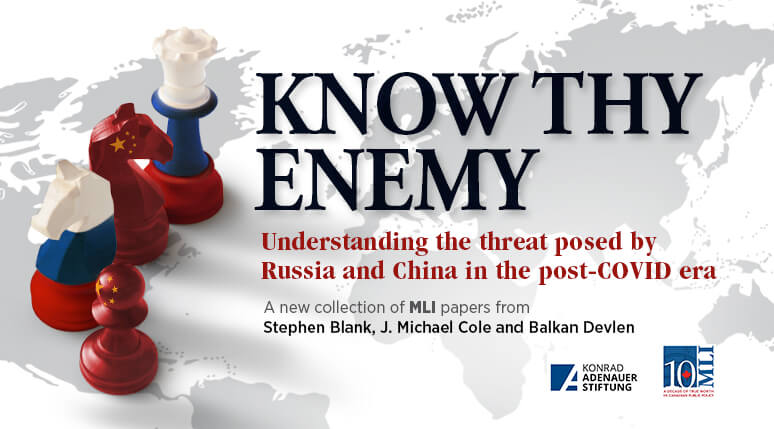OTTAWA, ON (September 28, 2020): The COVID-19 pandemic has illuminated how China and Russia have sought to take advantage of the West’s good will and the openness of the international system.
In a new three-part MLI paper, titled “Know Thy Enemy: Understanding the threat posed by Russia and China in the post-COVID era,” authors Stephen Blank, J. Michael Cole, and Balkan Devlen examine the threat that Russia and China pose to the democratic world during the COVID pandemic and beyond. These respected scholars provide us with a clear-eyed view of what Beijing and Moscow want, and how Canada should respond.
Blank argues that Russia’s foreign policy is inextricably linked with its domestic governance structure. “Russia’s fundamental or overriding objective is to make the world safe for its autocracy,” explains Blank. The nature of Putin’s regime and the tools and strategies Russia deploys follow the framework of Russia’s “permanent war” with the West.
“This war never ceases – and it cannot so long as Russia’s state structure and accompanying outlook remain the same,” writes Blank. In response to Russia’s aggression, Blank argues that there is a need to revitalize Western leadership, bringing together likeminded allies to jointly address global issues.
For Cole, the threat posed by China stems from the ideology behind Xi Jinping’s strategic ambitions, the various means at Beijing’s disposal to exert power and influence, and the international implications of China’s resurgence. Cole highlights the CCP’s belief that “China’s moment has finally arrived.” Yet, despite its economic clout, China still lacks the soft power that the US and other Western countries enjoy.
As Cole explains, China instead resorts to “sharp power” operations through its United Front Work Department to erode and undermine the democratic systems of target countries. Cole provides a series of recommendations on how to respond to this multifaceted challenge, as well as making a heartfelt plea to the West.
“We must regain our footing and self-esteem by ignoring Chinese propaganda about the ‘inevitability’ of the West’s decline and through reinvestment in our human capital and belief in the wisdom of our democratic ideals,” writes Cole.
In the last chapter of this report, Devlen examines the commonalities between the CCP and the Kremlin’s subversion of international order. Devlen identifies three main drivers of the authoritarian challenge to the international order: “their neo-authoritarian ideology, the imperative of regime survival, and the shifting global balance of power.”
Devlen calls for a clear-eyed understanding of the authoritarian challenge, further study of political warfare and subversion, and the importance of developing societal resilience.
“If we wish to defend our freedoms and values against authoritarian subversion and preserve and protect the rules-based international order that enabled those freedoms as well as our prosperity, we should stand together,” argues Devlen.
To learn more about China and Russia’s aggression and how the West should respond, read the full report here.
MLI would like to thank its partner in this project, the Konrad Adenauer Stiftung
***
Stephen J. Blank is a senior fellow at the Foreign Policy Research Institute’s Eurasia Program. J. Michael Cole is a Taipei-based senior fellow at the Macdonald-Laurier Institute. Balkan Devlen is a senior fellow at the Macdonald-Laurier Institute.
For more information, media are invited to contact:
Brett Byers
Communications and Digital Media Manager
613-482-8327 x105
brett.byers@macdonaldlaurier.ca





